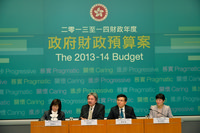 |
Financial Secretary Announces Budget for 2013-14 |
 |
| |
|
|
| |
 In February 2013, Hong Kong Financial Secretary Mr John Tsang delivered his first Budget address of the new Chief Executive’s term of Government. In February 2013, Hong Kong Financial Secretary Mr John Tsang delivered his first Budget address of the new Chief Executive’s term of Government.
The main themes of the Budget – “developing the economy, optimising human resources, investing in infrastructure and caring for people's livelihood" – echoes the directions of the Hong Kong Government as outlined by the Chief Executive Mr C Y Leung in his Policy Address earlier in the year.
Fiscal outlook
The Financial Secretary forecast a Budget surplus of about HK$64.9 billion in 2012-13 mainly due to higher-than-expected revenue from earnings and profits tax. By the end of March 2013, the fiscal reserves are expected to be HK$734 billion, equivalent to 36% of GDP or 23 months of government expenditure.
Hong Kong's simple and low tax regime, with a corporate profit tax of 16.5% and a maximum of 15% (for personal tax) remain unchanged.
The healthy budgetary situation allowed the Financial Secretary to announce a range of tax concessions and other measures to ease the burden for families.
In 2013-14, social welfare, education and medical services continue to be the Government's major expenditure areas. About HK$170 billion is budgeted for these three areas, about 60% of recurrent government expenditure. Education is the single largest spending area with estimated recurrent expenditure for 2013-14 of HK$63 billion, accounting for more than one-fifth of total recurrent government expenditure. For 2013-14, the Financial Secretary forecasts a HK$4.9 billion deficit. The fiscal reserves are estimated to stand at HK$729.1 billion by the end of March 2014, representing approximately 34% of GDP or equivalent to 20 months of government expenditure.
Investing in Infrastructure
Capital works expenditure for 2012-14 will reach HK$70 billion, which is expected to create about 75,000 job opportunities. Major infrastructure projects being undertaken or planned include a new metro line (i.e. Shatin to Central railway link); road projects (e.g. Central-Wan Chai Bypass, Tuen Mun-Chek Lap Kok Link); expansion and redevelopment of several public hospitals; construction of an indoor stadium; and development of organic waste treatment facilities in Lantau Island. |
|
| |
|
|
| |
Developing the economy
The two main areas of work highlighted in the Budget were: (1) fostering economic integration with Mainland China; and (2) strengthening Hong Kong's pillar industries (i.e. Trading and Logistics, Tourism, Financial Services, and Business and Professional Services) as well as supporting new industries. The key measures unveiled included:
|
|
| |
|
|
| |
Trading and logistics industry |
|
| |
 |
Designation of 12 hectares of land at Tuen Mun West and Tsing Yi for developing new logistics facilities |
|
|
| |
|
|
| |
Tourism |
|
| |
 |
Offering a HK$2.3 billion loan to the Ocean Park Theme Park (winner of the 2012 Applause Award, making it the world`s best theme park) to build an all-weather water world |
|
|
| |
|
|
| |
Financial services industry |
|
| |
 |
Expanding the size of the Government Bond Programme from HK$100 billion to HK$200 billion |
 |
Issuing inflation-linked bonds (iBond) worth up to HK$10 billion |
 |
Allowing private equity funds to enjoy the same tax exemption as offshore funds |
 |
Reducing profits tax on the offshore insurance business of captive insurance companies to attract them to establish in Hong Kong |
|
|
| |
|
|
| |
Emerging industries |
|
| |
 |
Providing Hong Kong’s six universities with a subvention of up to HK$12 million each for a period of 3 years to support technology transfers |
 |
Allocating HK$50 million to acquire local visual artists’ outstanding artworks |
|
|
| |
|
|
| |
Small and medium enterprises |
|
| |
 |
Waiving business registration fees for 2013-14 |
 |
Reducing profits tax for 2012-13 by 75%, subject to a ceiling of HK$10,000 |
 |
Increasing the cumulative amount of the grant under the SME Export Marketing Fund from HK$150,000 to HK$200,000 |
|
|
| |
|
|
| |
Optimising human resources
Substantial investment will be made in education and training, with key measures including: |
|
| |
 |
Injecting HK$5 billion into the Language Fund to support projects aimed at promoting bi-literacy and tri-lingualism among students |
 |
Injecting HK$480 million to the Government Scholarship Fund to set up scholarships for outstanding local students to pursue studies in prestigious overseas universities |
 |
Injecting HK$40 million to establish scholarships to give recognition to outstanding tertiary students with special education needs |
 |
Allocating HK$12 million to the Vocational Training Council to support students with special education needs |
 |
Establishing a HK$100 million training fund for maritime and aviation transport to attract young people to enrol in related skills training |
|
|
| |
|
|
| |
Caring for people's livelihood
To ease the pressure on the middle class, grassroots and SMEs, the Financial Secretary announced a range of counter-cyclical relief measures worth HK$33 billion. They include one-off measures such as tax concessions, electricity subsidies, extra welfare allowances, and waiving two months' rent for public housing tenants. The Financial Secretary also proposed injecting an additional HK$15 billion into the Community Care Fund to support the work of poverty alleviation. |
|
| |
|
|
| |
The full text of the 2013-14 Budget is available at http://www.budget.gov.hk/2013/index.html
|
|
| |
|
|

